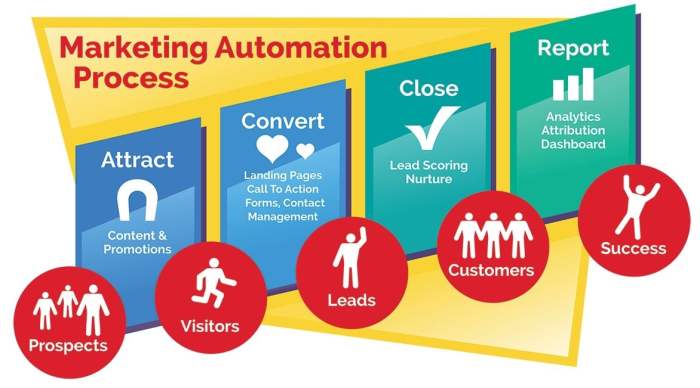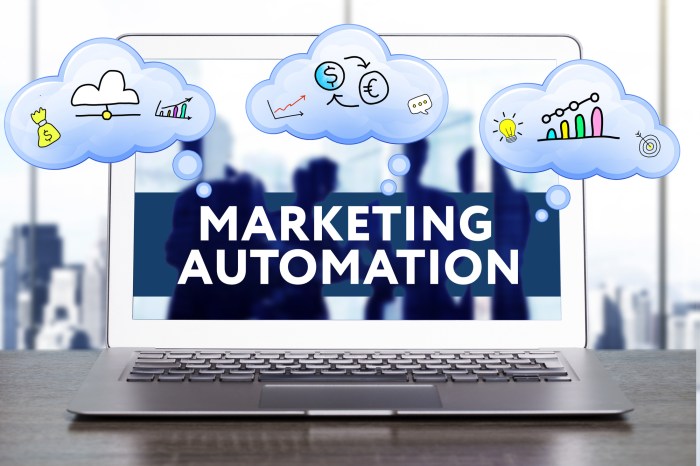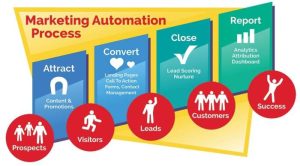
Get ready to dive into the world of direct marketing automation tools! Imagine a future where your marketing tasks are automated, making your life easier and your campaigns more effective. Let’s explore how these tools revolutionize the way businesses reach their audience.
Introduction to Direct Marketing Automation Tools
Direct marketing automation tools are software platforms that help businesses automate, streamline, and measure marketing tasks and workflows. These tools enable businesses to target their audience with personalized messages at the right time, increasing efficiency and effectiveness in marketing campaigns.
Benefits of Using Automation Tools in Direct Marketing
- Improved efficiency: Automation tools can save time by automating repetitive tasks such as email marketing, social media posting, and lead nurturing.
- Enhanced personalization: By utilizing customer data, automation tools can deliver personalized messages to each individual, increasing engagement and conversions.
- Better targeting: Automation tools allow businesses to segment their audience based on demographics, behavior, and preferences, ensuring that the right message reaches the right audience.
- Increased ROI: With improved efficiency, personalization, and targeting, businesses can see a higher return on investment from their marketing efforts.
Popular Direct Marketing Automation Tools
- HubSpot: Known for its all-in-one marketing automation platform, HubSpot offers tools for email marketing, social media, CRM, and more.
- Mailchimp: A widely-used email marketing platform that also offers automation features for creating targeted campaigns based on customer behavior.
- ActiveCampaign: This platform combines email marketing, automation, and CRM to help businesses personalize their marketing efforts and drive conversions.
- Marketo: Marketo is a comprehensive marketing automation tool that helps businesses engage with customers across multiple channels and track the performance of their campaigns.
Features of Direct Marketing Automation Tools
Direct marketing automation tools offer a variety of features that can help businesses streamline their marketing efforts and improve their overall efficiency. Let’s explore some of the key features that these tools typically offer:
1. Email Marketing Automation
- Automated email campaigns
- Personalized email content
- Scheduled email sending
- A/B testing for email effectiveness
2. Lead Management
- Lead scoring and segmentation
- Automated lead nurturing
- Integration with CRM systems
- Lead tracking and analytics
3. Social Media Marketing
- Social media scheduling
- Automated posting and engagement
- Social media analytics
- Integration with social platforms
4. Analytics and Reporting
- Real-time campaign analytics
- ROI tracking
- Performance dashboards
- Customizable reporting
These features help businesses automate repetitive tasks, personalize communication with customers, track campaign performance, and ultimately drive better results in their direct marketing efforts. By leveraging direct marketing automation tools, businesses can save time, optimize their strategies, and enhance their overall marketing ROI.
Implementation of Direct Marketing Automation Tools
Implementing direct marketing automation tools in a business can greatly streamline marketing efforts and improve efficiency. Here are some steps for successfully implementing these tools and integrating them into existing marketing strategies.
Steps for Implementing Direct Marketing Automation Tools
- Assess your current marketing processes and identify areas where automation can help improve efficiency and effectiveness.
- Research and choose the right marketing automation tool that aligns with your business goals and objectives.
- Set clear objectives and goals for implementing the tool, such as increasing lead generation, improving customer engagement, or boosting sales.
- Train your team on how to use the automation tool effectively and ensure they understand the benefits it can bring to the business.
- Start with a pilot program to test the tool on a small scale before fully integrating it into your marketing strategy.
- Monitor and analyze the results of the automation tool to make adjustments and optimize its performance over time.
Best Practices for Integrating Direct Marketing Automation Tools
- Ensure seamless integration with existing CRM systems to centralize customer data and improve targeting and personalization.
- Create customer personas and segment your audience to deliver more targeted and relevant marketing campaigns.
- Use data analytics to track and measure the success of your automated campaigns and make data-driven decisions for future strategies.
- Personalize your marketing messages and content based on customer behavior, preferences, and interactions with your brand.
- Implement lead scoring and nurturing strategies to prioritize and engage with high-quality leads effectively.
Examples of Successful Implementations
- A company implemented a marketing automation tool to send personalized emails based on customer behavior, resulting in a 20% increase in email open rates and a 15% increase in click-through rates.
- Another business used automation to streamline their lead generation process, leading to a 30% reduction in manual tasks and a 25% increase in lead conversion rates.
Integration with E-Commerce Platforms

Direct marketing automation tools can be seamlessly integrated with e-commerce platforms to streamline marketing efforts and enhance customer engagement. These tools enable businesses to automate various marketing tasks such as email campaigns, social media posts, and personalized product recommendations based on customer behavior.
Advantages of using automation tools in e-commerce marketing
- Increased efficiency: Automation tools help businesses save time by automating repetitive tasks, allowing the marketing team to focus on strategic initiatives.
- Personalized customer experiences: By analyzing customer data and behavior, automation tools can deliver targeted messages and product recommendations, leading to higher conversion rates.
- Improved customer retention: Automation tools enable businesses to nurture customer relationships through personalized communication, leading to increased customer loyalty and repeat purchases.
- Enhanced data analytics: By tracking and analyzing customer interactions, businesses can gain valuable insights to optimize marketing campaigns and improve overall performance.
Examples of successful e-commerce businesses using direct marketing automation tools
- Amazon: Utilizes direct marketing automation tools to send personalized product recommendations, order confirmations, and targeted promotions based on customer browsing and purchase history.
- Sephora: Implements automation tools to send personalized beauty tips, product recommendations, and exclusive offers to customers based on their preferences and behavior.
- Zappos: Leverages automation tools to send targeted email campaigns, cart abandonment reminders, and loyalty program updates to enhance customer engagement and drive sales.
Impact on Advertising Strategies

Direct marketing automation tools have a significant influence on advertising strategies, revolutionizing the way businesses target and engage with their audience. By leveraging automation tools, companies can optimize ad targeting and personalization, leading to more effective and efficient advertising campaigns. Let’s delve deeper into how these tools can enhance advertising strategies and ultimately drive improved ROI.
Optimizing Ad Targeting
Automation tools enable businesses to gather and analyze vast amounts of customer data in real-time, allowing for more precise ad targeting. By segmenting audiences based on demographics, behavior, and preferences, companies can deliver personalized ads that resonate with individual consumers. This targeted approach not only increases the relevance of ads but also enhances the overall customer experience.
- Utilize predictive analytics to identify high-value customers and tailor ads to their specific needs and interests.
- Implement A/B testing to optimize ad creative, messaging, and placement for better performance and engagement.
- Integrate CRM data to create lookalike audiences and expand reach to potential customers with similar characteristics.
Improving Personalization
Automation tools empower businesses to create dynamic and personalized ad experiences for each customer, fostering stronger connections and driving conversions. By leveraging customer insights and behavior data, companies can deliver targeted messages at the right time and through the most effective channels, increasing the likelihood of conversion.
- Implement dynamic content insertion to display personalized offers and recommendations based on individual customer preferences.
- Utilize retargeting campaigns to re-engage with customers who have shown interest in specific products or services.
- Create automated email sequences that deliver relevant content and promotions based on customer interactions and engagement levels.
Case Studies: Improved Advertising ROI
Numerous case studies have demonstrated the tangible benefits of using direct marketing automation tools to enhance advertising strategies and drive ROI. Companies across various industries have reported significant improvements in key metrics such as click-through rates, conversion rates, and overall campaign performance.
For example, a leading e-commerce retailer saw a 30% increase in conversion rates after implementing personalized ad campaigns using automation tools to target specific customer segments.
Similarly, a software company achieved a 25% reduction in customer acquisition costs by leveraging automated ad optimization features to target high-value leads more effectively.
Another case study highlighted a 40% boost in ROI for a travel agency that utilized automation tools to deliver personalized travel recommendations and offers to customers based on their past booking history and preferences.
Role in Affiliate Marketing
Direct marketing automation tools play a crucial role in affiliate marketing programs by streamlining processes and improving efficiency. These tools help businesses to effectively track affiliate performance and conversions, leading to better decision-making and optimization of marketing strategies.
Tracking Affiliate Performance and Conversions
- Automation tools provide real-time data on affiliate activities, such as clicks, conversions, and sales, allowing businesses to monitor performance accurately.
- By analyzing this data, companies can identify high-performing affiliates, optimize campaigns, and allocate resources effectively to maximize ROI.
- These tools also enable businesses to track conversions generated by each affiliate, helping them to measure the effectiveness of their partnerships and adjust strategies accordingly.
Examples of Successful Affiliate Marketing Campaigns
- Amazon Associates: Amazon’s affiliate program is powered by advanced automation tools that track performance metrics and provide detailed reports to affiliates.
- Shopify Affiliate Program: Shopify utilizes automation tools to monitor affiliate activities, track referrals, and calculate commissions accurately, leading to a successful and scalable affiliate marketing campaign.
- Rakuten Marketing: Rakuten’s affiliate network leverages automation tools to analyze data, optimize campaigns, and drive conversions for merchants and affiliates alike.
Importance of Branding with Direct Marketing Automation
In the world of direct marketing automation, maintaining a strong and consistent brand identity is crucial for success. Let’s explore how direct marketing automation tools impact branding efforts and how they can help businesses strengthen their brand identity.
Consistent Messaging and Branding
Direct marketing automation tools allow businesses to streamline their marketing efforts and ensure that their messaging is consistent across all channels. By automating tasks such as email campaigns, social media posts, and website updates, companies can deliver a cohesive brand message to their target audience.
- Automation tools help in maintaining brand consistency by using predefined templates and guidelines for all marketing communications.
- By automating repetitive tasks, businesses can focus on creating high-quality content that aligns with their brand values and resonates with their audience.
- Consistent branding helps in building trust and credibility with customers, leading to increased brand loyalty and repeat business.
Leveraging Automation for Brand Identity
Here are some tips on how businesses can leverage direct marketing automation tools to strengthen their brand identity:
- Personalize communication: Use automation tools to segment your audience and deliver personalized messages that speak to their specific needs and preferences.
- Monitor brand mentions: Set up alerts and monitoring tools to track how your brand is being perceived online and respond promptly to any feedback or mentions.
- Consistent visual branding: Ensure that all marketing materials, from emails to social media posts, adhere to your brand guidelines in terms of colors, fonts, and imagery.
- Integrate feedback loops: Use automation to gather feedback from customers and incorporate their suggestions into your branding strategy to improve customer satisfaction.
Enhancing Direct Marketing with Internet Marketing
In today’s digital age, the combination of direct marketing automation tools and internet marketing strategies can significantly enhance a company’s marketing efforts. By integrating these two powerful tools, businesses can reach a wider audience, engage with customers on a more personal level, and drive conversions effectively.Direct marketing automation tools allow businesses to streamline their marketing processes, automate repetitive tasks, and personalize communication with customers.
When combined with internet marketing strategies, such as social media marketing, content marketing, and search engine optimization, companies can create a comprehensive and targeted approach to reaching their target audience.
Synergy between Direct Marketing Automation and Internet Marketing
- Direct marketing automation tools can help businesses segment their audience based on their online behavior, preferences, and interactions, allowing for more personalized and targeted internet marketing campaigns.
- Internet marketing channels can drive traffic to landing pages, forms, and other touchpoints where direct marketing automation tools can capture and nurture leads, leading to increased conversions and sales.
- By analyzing data from internet marketing campaigns and direct marketing automation tools, businesses can gain valuable insights into customer behavior, preferences, and trends, enabling them to optimize their marketing strategies for better results.
Examples of Successful Campaigns
One example of a successful campaign combining direct marketing automation and internet marketing is a personalized email marketing campaign that targets customers based on their browsing history and online interactions. By using direct marketing automation tools to send personalized emails with relevant content and offers, businesses can effectively engage with customers and drive conversions.
Another example is a social media advertising campaign that targets specific customer segments identified through direct marketing automation tools. By creating targeted ads and content based on customer data, businesses can increase engagement and conversions through internet marketing channels.
Utilizing Mailing Lists with Direct Marketing Automation
When it comes to direct marketing automation, utilizing mailing lists plays a crucial role in reaching out to your target audience effectively. Mailing lists help in segmenting your audience based on various factors, allowing you to personalize your campaigns and increase engagement.
Segmenting and Personalizing Mailing List Campaigns
Automation tools offer the ability to segment your mailing lists based on demographics, behavior, purchase history, and more. This segmentation allows you to tailor your messages to specific groups, increasing the relevance of your content and improving the chances of conversion.
- Use past purchase behavior to send targeted product recommendations to customers who have shown interest in similar items.
- Segment your lists based on location to promote local events or offers that are relevant to specific regions.
- Personalize emails with the recipient’s name and other relevant details to create a more personalized experience.
Maximizing the Effectiveness of Direct Marketing with Targeted Mailing Lists
Here are some tips to maximize the effectiveness of your direct marketing campaigns using targeted mailing lists:
- Regularly clean and update your mailing lists to ensure you are targeting active and engaged subscribers.
- Use A/B testing to optimize your email content, subject lines, and calls to action for better results.
- Monitor and analyze the performance of your campaigns to identify areas for improvement and refine your targeting strategy.
Closing Summary
In conclusion, direct marketing automation tools are the key to unlocking a new level of efficiency and success in your marketing endeavors. Embrace automation, streamline your processes, and watch your business thrive in the digital age.
Frequently Asked Questions
How do direct marketing automation tools benefit businesses?
Direct marketing automation tools help businesses save time, improve targeting, increase efficiency, and drive better results with personalized campaigns.
Can direct marketing automation tools be integrated with e-commerce platforms?
Yes, direct marketing automation tools can seamlessly integrate with e-commerce platforms to enhance marketing strategies and boost sales.
What role do these tools play in affiliate marketing?
Direct marketing automation tools play a crucial role in tracking affiliate performance, optimizing conversions, and running successful affiliate campaigns.
How can direct marketing automation tools enhance branding efforts?
These tools help maintain consistent messaging and branding, strengthening brand identity through automated processes.
What is the importance of utilizing mailing lists with direct marketing automation?
Mailing lists are essential for personalized campaigns, and automation tools can segment and target audiences effectively for maximum impact.





